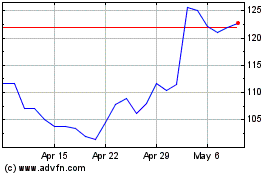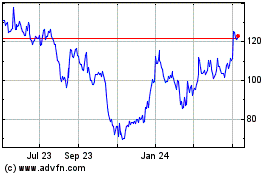By Sabrina Siddiqui and Stephanie Armour
WASHINGTON -- President-elect Joe Biden will seek to release
nearly all available coronavirus vaccine doses to accelerate
distribution, his transition team said Friday, in a shift from the
Trump administration's policy of holding back stock for second
doses.
"The president-elect believes we must accelerate distribution of
the vaccine while continuing to ensure the Americans who need it
most get it as soon as possible," said TJ Ducklo, a spokesman for
Mr. Biden's transition. "He supports releasing available doses
immediately, and believes the government should stop holding back
vaccine supply so we can get more shots in Americans' arms
now."
Mr. Ducklo said Mr. Biden, who will be inaugurated on Jan. 20,
will release additional details about his vaccine distribution
plans next week.
The announcement comes as the U.S. and many other countries are
struggling to ramp up vaccination programs. The Trump
administration had promised to vaccinate 20 million people by the
end of 2020.
The administration has been holding back about half of the
vaccination doses for second shots. The administration has
distributed 21.4 million vaccination doses from Moderna Inc. and
Pfizer Inc. with BioNTech SE, and 5.9 million people have received
the first dose as of Jan. 7, according to the Centers for Disease
Control and Prevention.
Some medical authorities, including the U.S. Food and Drug
Administration, have said delaying the second dose of the vaccine
is potentially detrimental to public health. A Biden transition
official said the president-elect is confident that manufacturers
can produce enough vaccines to deliver second doses in a timely
manner, while adding Mr. Biden will use the Defense Production Act
to boost supply.
News of the Biden administration's release plan was first
reported by CNN.
The plan follows a letter from a group of Democratic governors
to Health and Human Services Secretary Alex Azar and Operation Warp
Speed Chief Operating Officer Gen. Gustave Perna asking the federal
government to immediately begin distributing reserved doses.
Mr. Biden has promised a more robust response to steering the
nation out of the coronavirus pandemic, which has infected more
than 21 million people across the U.S. and claimed more than
360,000 lives.
The decision could help increase the number of people who
receive the vaccine. But it also raises the risk about the ability
to have reserves to provide booster shots and could strain some
states that lack the staffing or infrastructure to meet potential
demand.
Some state public health officials said they haven't yet
received information from Mr. Biden's transition team on changes to
the vaccine rollout that may be planned, which they say they need
to anticipate any hiring or workflow changes.
U.S. Department of Health and Human Services leaders who have
been overseeing the coronavirus response team are preparing to
leave, and some staff who handle communication and coordination
have been told they will be replaced after they offered to stay in
their roles to help during the transition. Concerns are mounting
that the vaccine rollout could be further disrupted by the
changeover, according to two people familiar with the planning.
"If President-elect Biden is calling for the distribution of
vaccines knowing that there would not be a second dose available,
that decision is without science or data and is contrary to the
FDA's approved label," said Michael Pratt, a spokesman for
Operation Warp Speed.
"If President-elect Biden is suggesting that the maximum number
of doses should be made available, consistent with ensuring that a
second dose of vaccine will be there when the patient shows up,
then that is already happening," he added. "Second-dose management
was always about ensuring supply-chain availability."
The vaccine rollout has been sluggish. Dr. Anthony Fauci, a top
government infectious-disease expert, said this week that the U.S.
will soon be able to give one million vaccinations a day. But even
that stepped-up pace would put the country on track to fully
immunize 80% of the population by June of 2022.
"We really should be at at least three million a day," said
Ashish Jha, dean of the Brown University School of Public Health,
who on Friday praised the decision to release more of the second
doses.
Pressure has been growing from public-health officials and
Democrat state leaders to release the second doses, and the urgency
has risen because a new, more transmissible strain of the virus has
been found in the U.S. California Democrat Gov. Gavin Newsom and
New York Gov. Andrew Cuomo, also a Democrat, this week pressed HHS
to release second doses.
The White House coronavirus task force this week had discussed
possible changes to the vaccine rollout, including whether more
vaccines should be sent to states that are making more rapid
progress on getting shots administered, according to a person
familiar with the discussions.
They also discussed possibly allowing second shots to be given
at five or seven weeks after the first instead of at three or four
weeks, the person said. The decision to hold back second doses
wasn't made by the task force, the person said.
Mr. Azar went to Camp David this week, where he talked with Gen.
Perna about how to increase the pace of vaccine administration. Mr.
Azar on Wednesday said states can adjust their criteria to begin
giving vaccines to lower-priority groups.
The release of more vaccination doses could further strain some
states that have for months been calling for more funding to help
them staff up and handle administration of the shots. Congress in
December approved a vaccine relief package that includes about $8
billion for states.
"Public health has been scaled up to deal with it, but vaccine
allocation has not gone up," said Claire Hannon, executive director
of the Association of Immunization Managers, which works with
states and territories on immunization. "We keep thinking it's
going to ramp up and it isn't."
Write to Sabrina Siddiqui at Sabrina.Siddiqui@wsj.com and
Stephanie Armour at stephanie.armour@wsj.com
(END) Dow Jones Newswires
January 08, 2021 14:05 ET (19:05 GMT)
Copyright (c) 2021 Dow Jones & Company, Inc.
Moderna (NASDAQ:MRNA)
Historical Stock Chart
From Mar 2024 to Apr 2024

Moderna (NASDAQ:MRNA)
Historical Stock Chart
From Apr 2023 to Apr 2024
